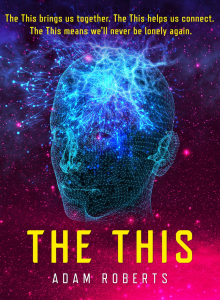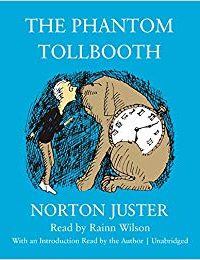Ian Mond Reviews The This by Adam Roberts
 The This, Adam Roberts (Gollancz 978-1-47323-092-7, £16.99, 304pp, hc) February 2022.
The This, Adam Roberts (Gollancz 978-1-47323-092-7, £16.99, 304pp, hc) February 2022.
In 2015, Adam Roberts wrote an extraordinary novel that deserved more attention and love than it received. The Thing Itself blended Fermi’s Paradox, Immanuel Kant’s The Critique of Pure Reason and John Carpenter’s The Thing (with a side-dish of wry humour and literary allusions) to deliver a madcap, centuries-spanning meditation on the ineffable nature of reality. Roberts’s latest novel, the awkward yet appropriately titled The This, is a thematic sequel to The Thing Itself. Where The Thing Itself makes literal Kant’s conception of Ding an Sich – a reality independent of our consciousness – The This gives form to the Weltgeist or “world spirit,” a key pillar of Georg Wilhelm Friedrich Hegel’s most famous treatise, The Phenomenology of Spirit. If that all sounds a little dense and pretentious, fear not. Like The Thing Itself, The This is an utterly bonkers, structurally ambitious novel about love, immortality, and the technological singularity.
The novel’s title refers to a popular social media app that allows a person, via a “somatic implant, injected into the roof of the mouth,” to post a Tweet or communicate with friends just by thinking their message (a form of “functional telepathy”). Rich Rigby, freelance writer, author of an unpublished epic fantasy novel and collector of banknotes, has no interest in the technology or concerns that the platform and its user base are exhibiting cult-like behaviour. But when he takes on a commission to interview the company’s CEO – the very striking Aella Hamilton – Rich finds himself embroiled in a government-led plan to infiltrate and bring down “The This” before it becomes a gestalt that will overwhelm humanity.
Working alongside Rich’s story is a second thread set several decades into the future, where the human race is at war with a Hive Mind. Adnan, though, barely knows the conflict is happening. He’s more interested in fixing Elegy, his Phene (an unsettling cross between a sex-bot and phone), who has started taking on the face of his mother while they’re making love. But when that very same mother (Adnan’s only source of income) leaves for Europe to join the Hive Mind, and after Elegy glitches the face of a man who leaves Adnan with an enigmatic message about the war, he feels compelled to join the Army. And it’s while on the front line, as indestructible war machines slaughter Adnan’s unit, that he accidentally discovers he holds the key to stopping the Hive Mind.
Roberts doesn’t ease us into his story. The opening chapter, set in the Bardo where “subject is object” and where our narrator experiences the life of every person who has ever lived, is this terrific slice of experimental fiction that could, almost, stand alone as a short story. In a similar vein, our introduction to Rich Rigby is anything other than conventional. The layout of each page is split between Rich’s first encounter with “The This” and a stream of Twitter posts where, amongst the dross, we get the suggestion there’s something insidious about the new platform. To misquote Douglas Adams – whose appreciation of the absurd is echoed in Roberts’s fiction – after a while the style settles down a bit and the plot begins to take shape. But even then, the story, which switches viewpoints and settings on a dime, including a visit to an Orwellian reality adjacent to ours, never entirely fixes on a single perspective. And yet, incredibly, Roberts nails the ending. He draws all the threads together in an expository-heavy climax that’s truly fascinating and enthralling.
Then there’s Roberts’s take on arguably one of the most challenging works of philosophy in the European canon. His joke on Twitter that The This is “a science-fictional novelisation of Hegel’s Phenomenology of Spirit” underplays the arduous task he set himself. And yet, Roberts pulls it off with extraordinary aplomb. Going back to the opening chapter, he vividly brings to life the Hegelian view that we are all the subject and object of history. It’s an idea that extends to Roberts’s literal interpretation of Hegel’s conception of the world spirit, the belief that each of us is an aspect of a Prime Mover or God that’s seeking to realise itself, a spiritual endpoint that is threatened by the immortality promised by a technological singularity. But the real stand-out, and the heart of the novel, is how Roberts applies Hegel’s principle of the “negation of the negation” – where an object and its opposite come together to form something new. Roberts applies this hard-to-get-your-head-around notion to the nature of love itself. As exemplified by Adnan and his deep adoration for Elegy, we come to learn that love only exists in relationship to another person (or object) and from that relationship, that encounter with “difference,” we “come to love [ourselves].”
But for all the Hegelian cleverness and structural quirks, it’s important to stress that The This is an accessible, frequently funny novel featuring two flawed but sympathetic protagonists, several unexpected narrative detours, and an appreciation of the spiritual – both religious and secular – that I found moving
Ian Mond loves to talk about books. For eight years he co-hosted a book podcast, The Writer and the Critic, with Kirstyn McDermott. Recently he has revived his blog, The Hysterical Hamster, and is again posting mostly vulgar reviews on an eclectic range of literary and genre novels. You can also follow Ian on Twitter (@Mondyboy) or contact him at mondyboy74@gmail.com.
This review and more like it in the February 2022 issue of Locus.
 While you are here, please take a moment to support Locus with a one-time or recurring donation. We rely on reader donations to keep the magazine and site going, and would like to keep the site paywall free, but WE NEED YOUR FINANCIAL SUPPORT to continue quality coverage of the science fiction and fantasy field.
While you are here, please take a moment to support Locus with a one-time or recurring donation. We rely on reader donations to keep the magazine and site going, and would like to keep the site paywall free, but WE NEED YOUR FINANCIAL SUPPORT to continue quality coverage of the science fiction and fantasy field.
©Locus Magazine. Copyrighted material may not be republished without permission of LSFF.




